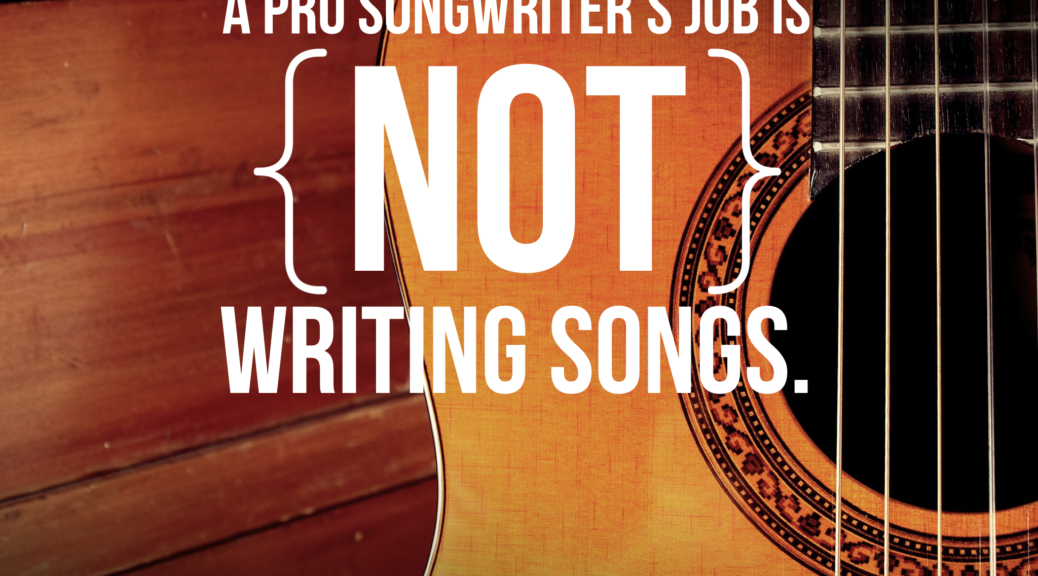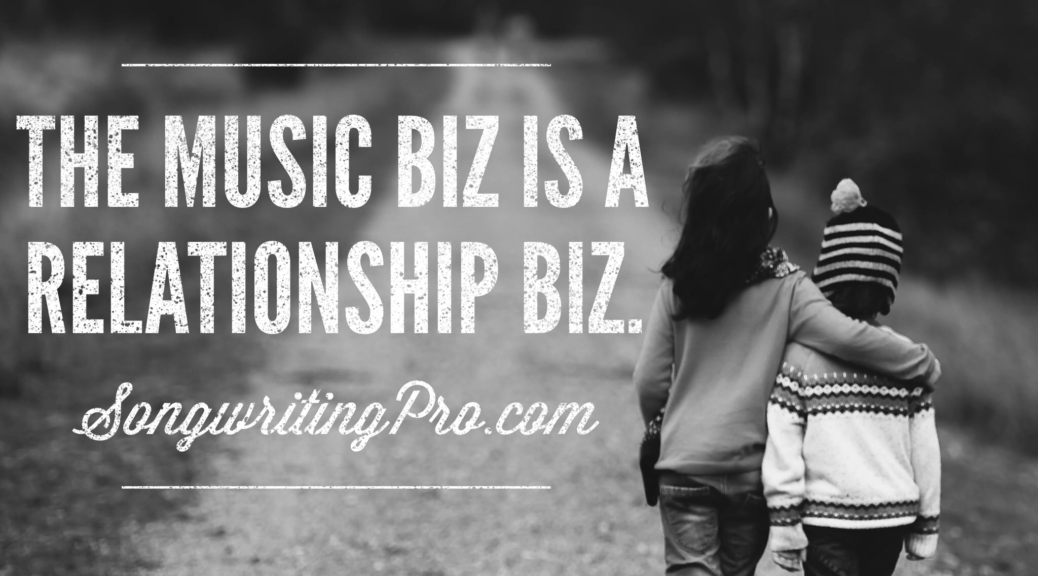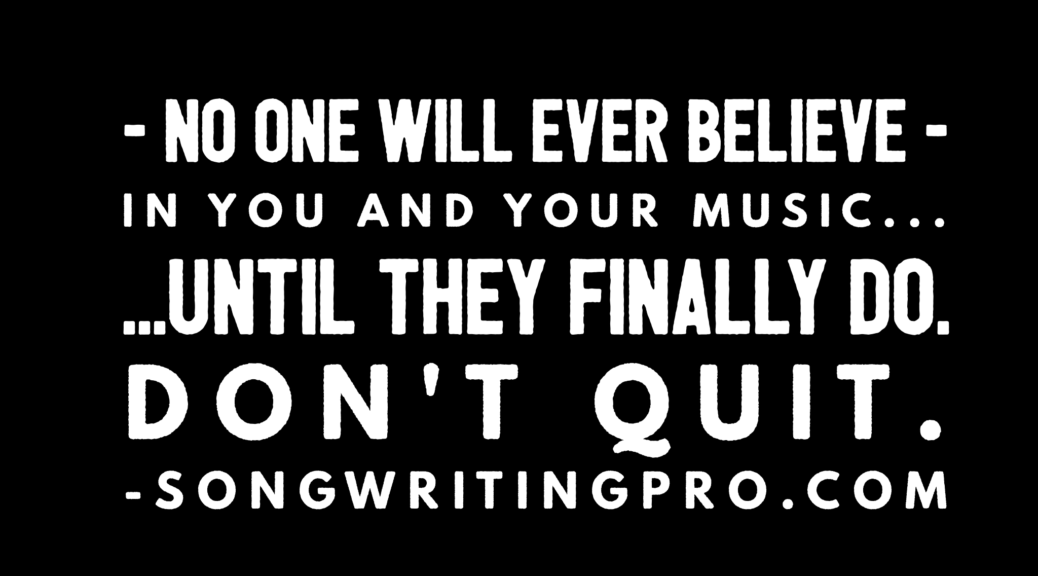When I signed my first staff songwriting deal, I thought it was so cool to “have a job writing songs.” But I was wrong. Writing songs was NOT my job.
Wait. What? As a staff songwriter in a publishing deal, isn’t “writing songs” exactly what they pay you for?
No. They aren’t paying you to write songs. Want to know what they are really paying you for? Read on.
________________________________
To BE a pro, you need to THINK like a pro, and this FREE ebook will help transform your thinking, your songwriting, and your success. Get it today!
_________________________________
A pro songwriter’s job is NOT just to write songs.
I was signed to Major Bob Music for 3 years. During that time, I turned in about 250 songs. That’s an average of about 83 songs per year. Yeah, I was writing a LOT.
Of those 250 songs, about 70 are demoed and 60 have a guitar/vocal recording. So a little over half of my Major Bob songs are in a form suitable for pitching to an artist or label.
And during those years, I had a bunch of holds ranging from Brad Paisley, Carrie Underwood, George Strait, Lee Ann Womack, and more. So I was getting some holds.
And some artists recorded my songs, too. These included a great signer named John Pierce on RCA who cut my song, “Ring On The Bar.” The legendary Randy Travis recorded my song “Every Head Bowed.” And a new act called Lady Antebellum recorded two of my songs, “A Woman Scorned” and “Last Night Last” for their debut album.
250 songs, 130 demos or guitar/vocals, many holds, and a few cuts. And I lost my publishing deal.
I lost my publishing deal because I didn’t do my job.
So what the heck was my job if it wasn’t writing songs, making demos, getting holds and getting cuts????

A pro songwriter’s job is writing songs… that make MONEY.
Those 250 songs I wrote? Most of them never made a dime for Major Bob. (That’s the case for 99.9% of songs written for publishers, by the way.) The demos? The ones that didn’t get cut by a fairly big artist actually cost Major Bob money. They had to pay the musicians, studio, etc.
So what about my cuts?
The John Pierce record never came out. The Randy Travis record didn’t come out until about a year after my Major Bob deal was over. And the Lady Antebellum songs were cut the week My deal ended, so it was too little too late. (They went on to become bonus tracks that have made a little money, but nothing life-changing.)
Bottom line: my catalog didn’t make enough money to keep my gig at the publishing company.
Now, I’m not sharing this to complain. I’ve been blessed to have some songs that have done quite well. And I’ve had several songs that have brought in a little cash here and there. I went on to have other publishing deals.
I’m sharing this because you need to know the truth about being a professional songwriter.
If you want to be a pro songwriter, simply writing songs is NOT enough. Heck, even writing really good songs is not enough. Your songs have to make money if you want to do this for a living or even as a good side gig.
I had a blast writing songs at Major Bob. I keep in touch with the folks there, and I appreciate the investment they made in me and my career. If I could go back and change anything, I would’ve focused less on “writing songs” and focused more on “writing songs that make money.”
I would’ve paid a lot more attention to the business parts of writing: writing market-smart, pitching my own songs, building a stronger team of cowriters, building a stronger business network, and making decisions in my songs that made them more commercially relevant.
I learned an invaluable lesson in a painful way. And I want to help YOU avoid that same pain.
Knowing what a pro songwriter’s real job is- and writing like it- can make a big difference in YOUR songwriting. Applying “cut/able” techniques will help you write market-smart songs: songs that have a competitive advantage in the market.
If you want to dive into songwriting craft; if you want learn how to write songs that will get you noticed in the music business, I have a great opportunity for you.
Every Monday night in October, I’m hosting The C4 Experience. It’s an exclusive, live online event where I help 10 writers like YOU create explosive growth in your commercial songwriting. I want you to win, and I’m going to help you write songs that artists want to sing, radio wants to play and fans want to hear.
CLICK HERE TO GET ALL THE DETAILS AND RESERVE YOUR SPOT IN THIS EXCLUSIVE EVENT!
God Bless and Enjoy the Journey,
Brent
Brent Baxter is a hit songwriter with cuts by Alan Jackson, Randy Travis, Lady Antebellum, Joe Nichols, Gord Bamford, Ruthie Collins, Ray Stevens and more. He’s written a top 5 hit in the US, a #1 in Canada, and a top 10 in Texas. His songs appear on 5 industry-certified gold & platinum albums & singles… so far. He also hosts a top-rated songwriting and music business podcast called, “The C.L.I.M.B.” which can be found on iTunes or your favorite podcast app.



































